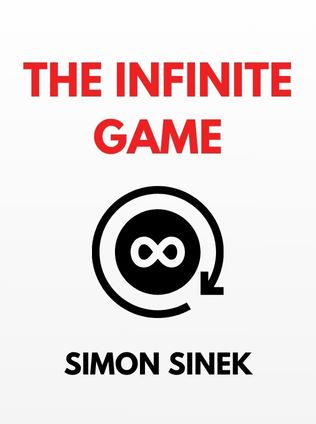
The Infinite Game
By Simon Sinek
Published 10/2019
About the Author
Simon Sinek is an acclaimed author, motivational speaker, and organizational consultant known for his thought-provoking ideas on leadership and business. His earlier works, including "Start With Why," "Leaders Eat Last," "Together Is Better," and "Find Your Why," have established him as a leading voice in contemporary business thinking. Sinek's core philosophy revolves around inspiring individuals to find purpose and fulfillment in their professional lives, advocating for a world where people wake up inspired, feel safe at work, and return home content. His ability to blend insightful theory with practical application has made his books popular among leaders striving to foster a more meaningful work environment.
Main Idea
In "The Infinite Game," Simon Sinek challenges the conventional finite mindset that dominates business thinking. Unlike finite games such as chess or football, where the rules are clear, and the outcome is determined by a winner and a loser, business, according to Sinek, is an infinite game. In an infinite game, the primary objective is not to win but to perpetuate the game itself, continually striving for progress and innovation. Sinek introduces five essential practices that leaders must adopt to embrace an infinite mindset: Advance a Just Cause, Build Trusting Teams, Study Your Worthy Rivals, Prepare for Existential Flexibility, and Demonstrate the Courage to Lead. These principles guide leaders to focus on long-term sustainability and ethical responsibility, rather than short-term gains and competition.
Table of Contents
- Introduction
- Advance a Just Cause
- Build Trusting Teams
- Study Your Worthy Rivals
- Prepare for Existential Flexibility
- Demonstrate the Courage to Lead
- Conclusion
Advance a Just Cause
Sinek begins by urging leaders to advance a Just Cause—a vision of a future state that is so inspiring it motivates people to make sacrifices for its realization. Unlike mere mission statements or corporate goals, a Just Cause must be durable, resilient, and timeless. It transcends profits and market metrics, aiming instead for a higher purpose that rallies employees and stakeholders alike.
For instance, Sinek cites Apple’s approach during the iPod era. When faced with competition from Microsoft's Zune, Apple's focus wasn't on the competitor but on innovating beyond the iPod itself. The cause wasn't about defeating Microsoft but about creating products that truly enriched users' lives.
“There is no such thing as ‘winning business.’”—Simon Sinek
To craft a Just Cause, companies must define a specific vision of a future that doesn't yet exist but is worth striving for. This vision should be compelling enough to inspire daily dedication and endless sacrifices from everyone involved. This vision must be so inspiring that employees are willing to give their all, day in and day out, for something they believe is bigger than themselves.
what a Just Cause might look like include:
- A technology company committed to creating products that enhance human connectivity and foster a sense of global community.
- A healthcare organization dedicated to eradicating a particular disease, driven by a vision of a healthier, disease-free world.
- A non-profit focused on environmental sustainability, aiming to leave the planet in better shape for future generations.
These causes are not about being the best in the market but about making a significant, positive impact on the world.
Sign up for FREE and get access to 1,400+ books summaries.
You May Also Like
The Subtle Art of Not Giving a F*ck
A Counterintuitive Approach to Living a Good Life
By Mark MansonRich Dad Poor Dad
What the Rich Teach Their Kids About Money - That the Poor and Middle Class Do Not!
By Robert T. KiyosakiHow To Win Friends and Influence People
The All-Time Classic Manual Of People Skills
By Dale CarnegieQuiet: The Power of Introverts
The Power of Introverts in a World That Can't Stop Talking
By Susan Cain



















